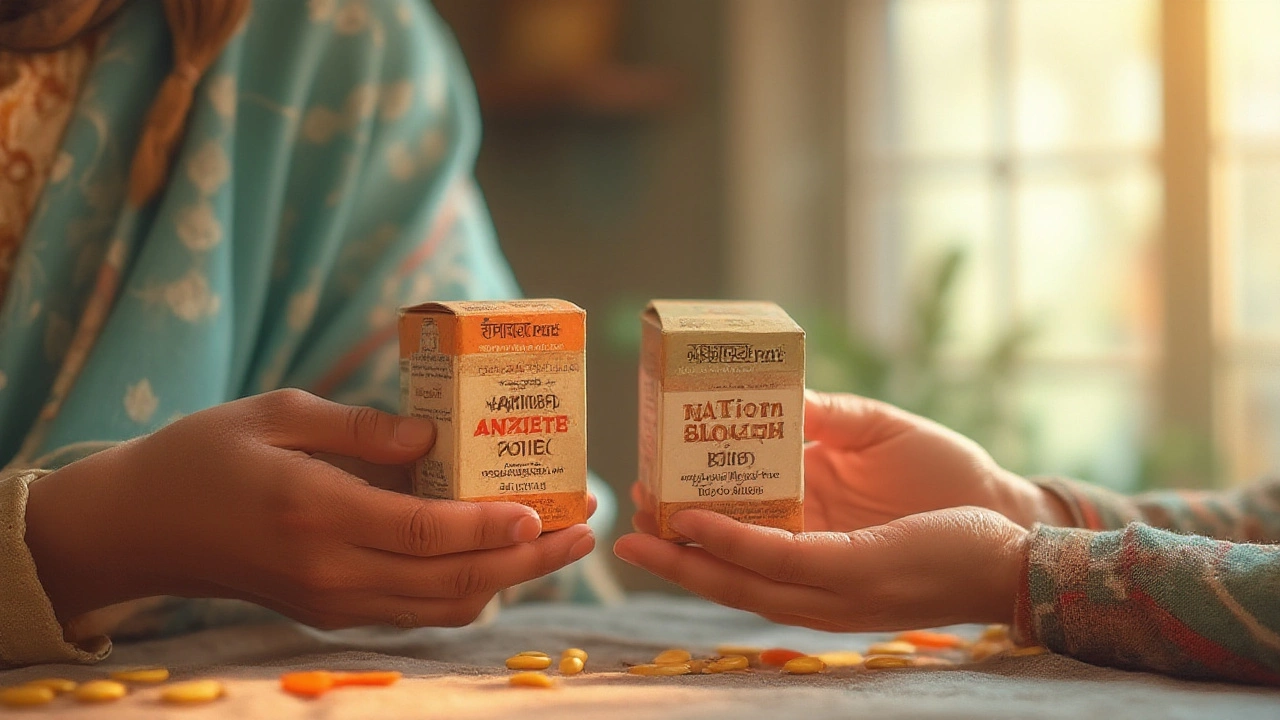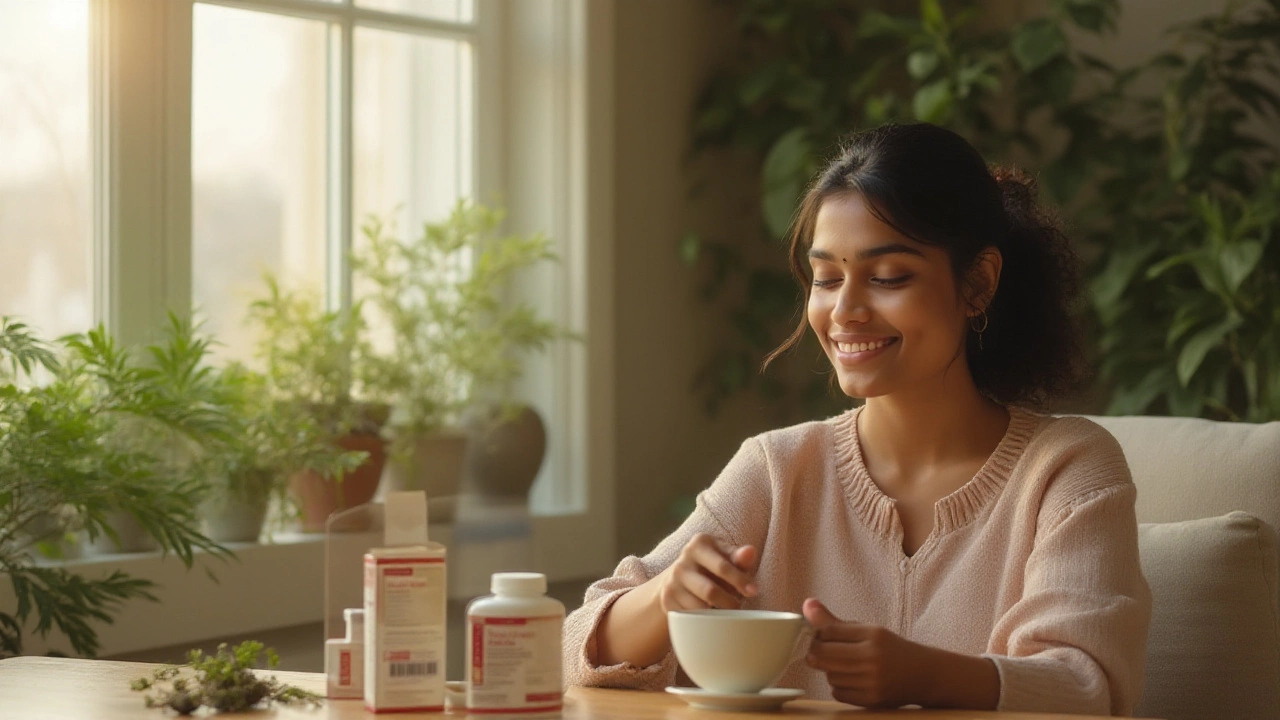Feeling stressed and on edge seems almost normal in 2025. Try asking anyone who hasn’t been chasing deadlines, juggling bills, or doomscrolling before bed—it’s rare. So it’s no surprise that so many people are searching for something to take the edge off. Prescription meds like Xanax are known for smoothing out anxiety fast, but good luck getting a script without a hefty assessment—and let's be honest, the idea of long-term side effects or dependency can be pretty nerve-wracking itself. That’s where the question pops up: is there anything over-the-counter that really works like Xanax?
Understanding Why People Look for Xanax Alternatives
People don’t hunt down substitutes for Xanax just out of curiosity. That little pill’s reputation packs a punch—it’s famous for quick anxiety relief, almost like flipping a switch. But the catch? Xanax (generic name: alprazolam) is a benzodiazepine, which means it interacts with brain chemistry in a way that can quickly lead to tolerance and even addiction if you’re not careful. Missing a dose or quitting suddenly? Withdrawal’s no joke—think insomnia, panic attacks, even seizures in the worst cases.
Then, there’s the fact you simply can’t stroll into a pharmacy and pick up a prescription benzodiazepine off the shelf. Besides the legal stuff, doctors get stricter every year about who can get these drugs—thanks to rising numbers of people running into trouble with dependency. So a lot of folks want a middle road: something you can just buy, with less risk, but that actually calms anxiety, helps you sleep, or takes the edge off social jitters.
Of course, some want an “as needed” remedy for occasional panic or travel anxiety. Others are trying to cope with ongoing, low-level stress that doesn’t seem “serious enough” for heavy-duty meds. All these reasons feed the enormous interest in non-prescription, over-the-counter options. But do they exist? And do they actually work?
What’s Actually Available Over the Counter?
Walk into a typical pharmacy or health food store, you’ll see crowded shelves packed with 'calming' supplements, teas, homeopathics, and sleep remedies. Many have names that hint at their purpose: Stress Relief, Calm, Peaceful Mind, or Sleep Aid. But the list of what's inside varies wildly, and not every product is equally effective—or even safe for everyone.
Here’s what buyers commonly find:
- Valerian root: A well-known herbal choice, valerian is sometimes called “nature’s Valium.” It works as a mild sedative. Studies suggest it can help you fall asleep a bit faster, and possibly reduce anxiety symptoms, though the effect is mild compared to Xanax.
- L-theanine: This amino acid comes from green tea and is famous for creating a calm-but-alert state—no drowsiness. One Japanese study found L-theanine lowers stress and improves focus, especially in people who have trouble relaxing.
- Passionflower: Used for anxiety and insomnia in folk medicine, passionflower extracts may encourage relaxation. A few small studies found it worked almost as well as low doses of prescription anxiety meds, although research is still limited.
- CBD (Cannabidiol): Derived from hemp, CBD doesn’t get you high, but a recent wave of research shows it could reduce social anxiety, help with sleep, and calm racing thoughts. Many users say it works best at higher doses, but regulations vary by country and state.
- Magnesium: This essential mineral is involved in over 300 reactions in your body, including nerve function. Some clinical trials suggest supplementing magnesium may ease mild anxiety, especially if you’re low on it to begin with. Symptoms of deficiency—twitches, cramps, restlessness—are often overlooked.
- Diphenhydramine (Benadryl) and doxylamine: These are traditional antihistamines, not true anti-anxiety meds, but because they cause drowsiness, some people use them as a quick fix for sleep or nerves. Doctors advise caution—using these often can leave you groggy and is not a long-term solution.
Some over-the-counter products blend several of these ingredients, aiming for a synergistic effect. However, compared to over the counter Xanax alternatives, their action is generally gradual, not instant, and rarely as powerful as a prescription benzo.

What to Know Before Trying OTC Calming Products
If you’re tempted to pick up an OTC anxiety aid, it helps to know the pros and cons—and how to use them smartly. For one thing, “natural” doesn’t always mean totally safe. For example, valerian can interact with prescription drugs, and high-dose CBD might make you sleepy or lightheaded. Even magnesium, in excess, can mess with your stomach or cause other issues if you have certain kidney conditions.
Another thing people don’t realize: herbal supplements aren’t regulated as strictly as prescription drugs. Dosages can vary between batches, and some brands cut corners with fillers. In 2019, a Harvard study found that about 20% of herbal supplements tested didn’t actually contain the plant listed on the label or were contaminated with heavy metals. So if you’re considering using them, it pays to stick with reputable brands—look for third-party testing seals, like USP, NSF, or ConsumerLab.
If you’re using other meds, especially anything that affects your nervous system (antidepressants, antihistamines, blood pressure pills), double-check for interactions. Even simple-seeming remedies, like chamomile tea, can mess with some meds. It’s always smart to talk with a pharmacist or healthcare provider if you’re unsure, especially if you plan to use something beyond a few days.
And remember, most OTC options take longer to work than Xanax and are less likely to knock you out completely. They’re best for people who want gentle, gradual relief from everyday worries, trouble sleeping, or mild jitteriness—basically, more of a 'dialing down' than an on-off switch. If you find yourself reaching for them constantly or feel your anxiety’s getting worse, that’s a clear sign to check in with your doctor for a better solution.
Tips on Choosing the Right Option for You
The sheer range of anxiety-relief products can be overwhelming. So where do you start if you want an over-the-counter alternative to Xanax? Here’s a simple approach:
- Pinpoint your main need: Is it panic attacks, trouble falling asleep, social jitters, or just general everyday tension? The more specific you are, the easier it is to target with the right option.
- Try one at a time: Mixing supplements, herbs, and OTC drugs together makes it hard to tell what’s actually helping—or causing side effects. Give something 7-14 days on its own before adding another option.
- Start with half the recommended dose: Many people find they don’t need the full amount, especially with calming herbs, L-theanine, or magnesium.
- Track your response: Keep a notes app or journal. Log when you take it, how you feel after, and if any side effects or weird feelings pop up.
- Time it right: Most of these options work best when you catch anxiety early, before it turns into a full-blown spiral. For sleep, aim to take them 30-60 minutes before bed.
- Don’t expect miracles: If your anxiety is severe or involves panic attacks, most OTC solutions won’t be enough—skip straight to professional help to get support that matches your needs.
One more tip? Don’t fall for products that promise instant, powerful results or ‘natural benzodiazepines.’ If it sounds too good to be true, it probably is. Xanax’s calming power comes from direct effects on GABA (gamma-aminobutyric acid) in your brain—a function nothing truly replicates over the counter. It’s about finding gentle, everyday supports when you need to take the edge off, not seeking a prescription-level fix from a bottle at the pharmacy.

Other Strategies That Help When OTC Isn’t Enough
Sometimes, even the best over-the-counter alternatives won’t be quite enough—especially if anxiety is interfering with work, relationships, or daily life. That’s when it helps to know a few battle-tested skills and approaches beyond pills, teas, and tablets.
- Deep breathing and progressive muscle relaxation: These classic techniques really do calm your nervous system in minutes. Apps and YouTube channels make them easy to master, and you can use them anywhere—on the subway, mid-meeting, or before bed.
- Cognitive Behavioral Therapy (CBT): Decades of research prove this kind of therapy helps rewire anxious thoughts long-term. Even if you can’t see a therapist, digital programs and workbooks walk you through CBT basics at your own pace.
- Exercise: Every sweaty session nudges your brain into releasing its own natural anti-anxiety chemicals (endorphins and GABA), helping you feel calmer for hours.
- Eat smart: Blood sugar spikes and crashes amplify anxiety. Balancing meals, cutting back on caffeine, and hydrating well make a bigger difference than most people guess.
- Connect with people: Talking it out, even through texts, lowers your stress hormones and gives your brain a “safe signal.” Isolating only cranks anxiety up.
- Screen breaks: Endless scrolling, anyone? All that blue light and bad news keep your brain on high alert. Try turning your phone gray-scale or setting screen-free hours.
No over-the-counter product is a one-size-fits-all answer. But if you match the right supplement—or safe, gentle herbal—with healthy habits and real-life coping skills, you stand a stronger chance of taming anxiety without having to reach for prescription drugs. And isn’t that a relief?
